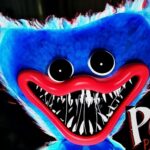
Poppy Playtime
All trademarks belong to their respective owners.Popular Now
 Call of Duty
Call of Duty
 Minecraft
Minecraft
 Roblox
Roblox
 Free Fire
Free Fire
 Rust
Rust
 Valorant
Valorant
 Auto X Drift Racing 3
Auto X Drift Racing 3
 Garena Free Fire: Kalahari
Garena Free Fire: Kalahari
 Poppy Playtime
Poppy Playtime
 League of Legends
League of Legends
Huggy Wuggy and Beyond: The Unsettling Evolution of Mascot Horror in Poppy Playtime
The horror genre has a long-standing fascination with taking the familiar and twisting it into something terrifying. Few recent games have exploited this inherent psychological vulnerability quite as effectively as Poppy Playtime, which has become a seminal example of the booming mascot horror subgenre. With its primary antagonist, Huggy Wuggy, and subsequent monstrous creations like Mommy Long Legs, the game masterfully subverts childhood innocence, transforming comforting toy aesthetics into grotesque, unsettling predators. This isn’t just about jump scares; it’s about the deep-seated psychological impact of a beloved symbol becoming a source of pure terror, marking a chilling evolution in horror design.
The Core Principle: Childhood Corrupted
Mascot horror thrives on the violation of innocent archetypes, and Poppy Playtime executes this flawlessly.
- The Uncanny Valley of Toys: The game plays directly into the uncanny valley phenomenon. Huggy Wuggy, at first glance, resembles a friendly, furry toy with wide eyes and a comforting smile. However, his disproportionate limbs, unnervingly wide grin, and silent, predatory pursuit quickly shift him from endearing to deeply disturbing. This subtle shift from familiar to alien is key to his unsettling nature.
- Subverting Expectations: Toys are designed for comfort, play, and safety. Poppy Playtime takes this deeply ingrained association and shatters it. The very objects meant to bring joy become instruments of terror, turning a universal symbol of childhood into a nightmare, which is profoundly unsettling on a psychological level.
- The Predatory Stalker: Unlike many monster designs that are explicitly gruesome, Huggy Wuggy’s initial appearance is deceptively “cute.” This makes his transition into a relentless, silent stalker all the more effective. The horror isn’t just what he is, but what he became, and the unsettling thought that something so innocent could harbor such malevolent intent.
From Huggy to Mommy: Evolving the Unsettling Design
Poppy Playtime expertly built on Huggy Wuggy’s success, expanding its roster of unsettling mascots while maintaining their core unsettling appeal.
- Mommy Long Legs: Elastic Horror: Mommy Long Legs, the antagonist of Chapter 2, introduced a new dimension of mascot horror: elasticity and contortion. Her seemingly friendly, almost motherly appearance (bright colors, wide smile) is immediately undermined by her unnaturally long, flexible limbs that allow her to move with spider-like agility and contort her body in disturbing ways.
- Playful Sadism: Mommy Long Legs’s character also brought a new layer of psychological terror through her “playful” sadism. She enjoys torturing the player, engaging them in twisted versions of children’s games (Statues, Musical Memory) before attempting to kill them. This adds a layer of emotional manipulation to the physical threat, making her a more complex and disturbing villain.
- The Bigger Body Mystery: The continuous introduction of new, larger-than-life toy monsters hints at a deeper, darker lore behind their creation, suggesting they are all failed experiments or corrupted versions of beloved mascots. This ongoing mystery fuels the player’s fear of what horrors the factory might still contain.
- Sound Design as a Character: Each mascot has a unique sound profile that contributes to their unsettling nature. Huggy Wuggy’s heavy footsteps and guttural roars, Mommy Long Legs’s unsettling lullabies and elastic stretching sounds – these audio cues become synonymous with terror and anticipation.
The Psychological Impact: Why it Works
The effectiveness of Poppy Playtime’s mascot horror lies in its ability to tap into primal fears.
- Violation of Trust: We are taught to trust toys. When those symbols of comfort turn malevolent, it’s a profound violation of that instilled trust, making the horror deeply personal and disturbing.
- Childhood Innocence Corrupted: The game preys on the fear of childhood innocence being twisted and defiled. The factory, once a place of creation for children, becomes a tomb of horrors, and the toys, once objects of joy, become instruments of death.
- Visual Discomfort: The designs intentionally evoke discomfort. Huggy Wuggy’s perpetual, unnatural smile, Mommy Long Legs’s unnaturally long limbs – these elements trigger an instinctive sense of “wrongness” that contributes to sustained dread rather than just sudden fright.
- Relentless Pursuit: The mascots aren’t static threats; they are relentless pursuers. This turns the game into a constant chase, enhancing the feeling of being hunted by something that should be benign but is utterly malevolent.
Poppy Playtime has not only capitalized on the mascot horror trend but has significantly contributed to its evolution. By taking the familiar, the innocent, and the comforting, and twisting them into grotesque, predatory forms, MOB Games has crafted a truly unsettling experience. Huggy Wuggy, Mommy Long Legs, and the sinister universe of Playtime Co. have cemented their place as modern icons of fear, proving that sometimes, the most terrifying monsters are born from the corrupted innocence of childhood dreams.
What’s another classic children’s character you think could be terrifying if turned into a horror villain?
Rating
PROS
- Engaging Gameplay: Thrilling and immersive with intuitive controls
- Creepy Setting: Vivid, contrasting abandoned toymaking factory design
- Sound Design: Masterful use of sound effects and appropriate music
- Superior Performance: Impressive performance even on mid-range PCs
CONS
- Short Game Length: The playtime may appear relatively short for seasoned players
- Fragmented Narrative: The storyline is somewhat disjointed and confusing
- Limited Rewards: Comparatively fewer in-game rewards and achievements
- No Multiplayer Mode: Lack of multiplayer options might reduce replay value for some
